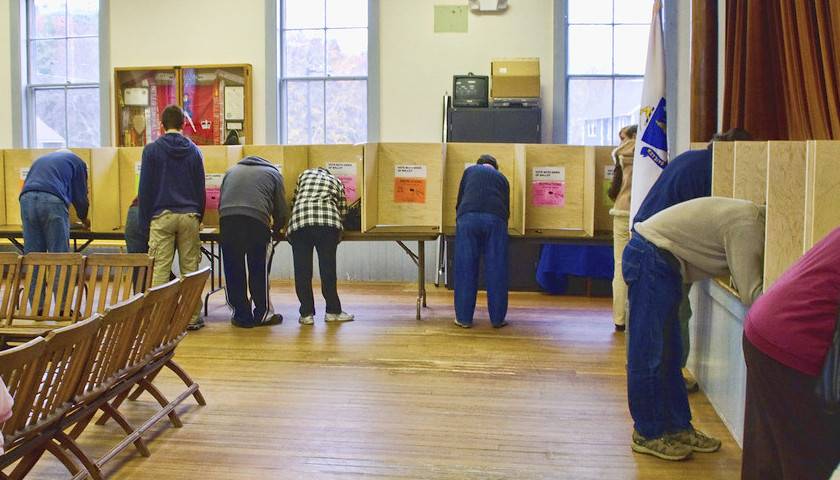by Natalia Mittelstadt
There are multiple ongoing or just-filed election lawsuits this year that could have wide-ranging impact on the 2024 elections, as plaintiffs from both sides of the political aisle challenge election laws or applications of them.
In 2020, there were as many as 400 lawsuits brought by both Republicans and Democrats regarding election procedures and laws as election administration was quickly changed during the COVID-19 lockdowns leading up to the presidential election. This year, new election lawsuits are focusing on candidate eligibility, different changes in law, and alleged violation of election laws. All of these lawsuits may greatly impact how the 2024 presidential election will be conducted.
Below are some of the most signficant lawsuits to follow in 2024:
Donald Trump v. Norma Anderson
On Thursday, the Supreme Court heard oral arguments in the case of Donald Trump v. Norma Anderson, in which the Colorado respondents have argued that the former president should be taken off the primary ballot because he allegedly incited an insurrection on Jan. 6, 2021.
Republican and unaffiliated voters in Colorado brought the lawsuit. The Colorado Supreme Court had overturned a ruling of a lower court, deciding that under the Section 3 “insurrection clause” of the 14th Amendment, Trump was disqualified from holding the office of president. Trump appealed the ruling to the U.S. Supreme Court.
During the oral arguments on Thursday, justices across the ideological spectrum appeared concerned in their questioning of the Colorado respondents’ lawyer on the legal reasoning for keeping Trump off the ballot and its implications nationwide.
Pennsylvania State Conference of the NAACP v. Chapman
The Pennsylvania State Conference of the NAACP sued the then-acting secretary of the commonwealth in 2022 regarding the commonwealth’s decision to not count mail-in ballots that are either missing a date on the outer return envelopes or have an incorrect date. Pennsylvania counties were ordered by a court following a Republican lawsuit in 2022 to reject undated or incorrectly dated mail-in ballots. However, the issue is still being litigated and has reached the 3rd U.S. Circuit Court of Appeals.
The NAACP argues that the mail-in ballots are valid – regardless of the incorrect or missing date – and should be counted.
Strong Communities Foundation of Arizona and Eric Lovelis v. Maricopa County
On Tuesday, America First Legal filed a lawsuit on behalf of Strong Communities Foundation of Arizona and a voter against Maricopa County Board of Supervisors and the Maricopa County recorder.
The lawsuit alleges that Maricopa County has violated multiple state election laws, such as refusing to maintain chain of custody for ballots and require in-person ballot curing for voters, as well as using artificial intelligence for signature verification on ballots instead of only humans.
The county, which has the largest population in Arizona, has had numerous election irregularities over the last several years.
Maricopa County didn’t respond to a request for comment.
Libertarian Party of MS v Wetzel et. al
Last Monday, Judicial Watch filed a lawsuit on behalf of the Mississippi Libertarian Party, challenging a state law that allows absentee ballots to be received and counted after Election Day.
Absentee ballots can be received as long as five days following the election.
Judicial Watch argues that under a recently enacted federal law, there cannot be an extension of Election Day barring any catastrophic events.
The Republican National Committee and the Mississippi Republican Party have also filed a lawsuit challenging this election law.
The Mississippi secretary of state’s office declined to comment due to pending litigation.
Late ballot acceptance deadlines have resulted in delays in tabulating and announcing election results, which the president of the Public Interest Legal Foundation, J. Christian Adams, has previously said leads “to distrust and chaos in the system.”
However, some election lawsuits can disrupt election administration, according to another election integrity watchdog.
Jason Snead, Executive Director of the Honest Elections Project, said last month that “One of the biggest threats that we’re gonna face between now and November is gonna be just a torrent of left-wing litigation.” He explained, “We saw the chaos, we saw the confusion, we saw the rules changes that [Marc] Elias and his operation were able to impose on states through the litigation process of 2020. And they’re already starting that up again this year.”
“I think litigation is gonna be one of the big, big threats because you can go into the November election with the best laws on the books, but if those laws are gutted in your courts, if those laws are gutted through consent agreements between a Democrat suing a Democrat, then that law is not worth the paper that it’s written on,” Snead said.
The Honest Elections Project recommended in an election reform report that states “Ensure that elected lawmakers write election laws,” rather than courts.
The reform states that “Legislatures should protect their constitutional authority to regulate elections by barring executive agencies from agreeing to legal settlements or consent decrees that substantively alter or weaken election laws. States should prohibit sue-and-settle litigation, in which activists and partisans sue officials to secure an agreement to ignore or effectively rewrite election law.”
– – –
Natalia Mittelstadt graduated from Regent University with Bachelor of Arts degrees in Communication Studies and Government.
Photo “People Voting” by liz west.CC BY 2.0.




